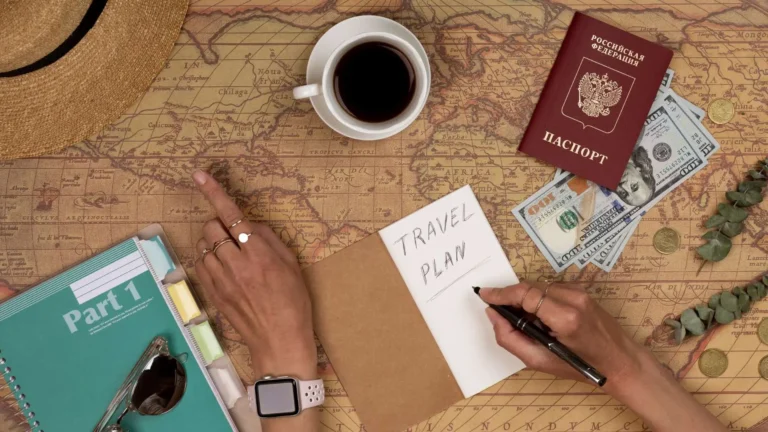Table of Contents
Introduction – Why Long-Term Travel Requires Careful Financial Prep
If you are considering a long trip or a move abroad, planning helps you stay organized—especially regarding money. Financial planning for major travel ensures you account for all expenses and avoid surprises. Getting the basics right early lets you focus on new experiences, interesting places, and meeting new people without stressing over unexpected costs.
Extended travel is not only about choosing destinations; it is also about making sure that your finances keep up with you so that you can manage all the costs that pop up during your travel.
If you don’t want to worry about bills or sudden emergencies from miles away, read the entire blog to have a clear picture of how you can prepare your finances for the trip so that your only role is to enjoy each moment of the adventure.
Also Read: Choosing Between HSA and FSA: Which Works for You?
Step 1 – Define Your Travel Timeline and Lifestyle Goals
The first and most crucial part of your travelling is setting up a travel timeline and lifestyle goals so that you have a plan ready to avoid any issues that may occur due to the location or duration you have scheduled.
Set Travel Duration and Location Plans
You should be precise about how long you will travel and where you want to visit. Next, ask yourself, “Am I going to travel to different places, or will I stay in a single place? ” Asking these questions will help you determine how to make a budget and pack up your things according to your location. Always plan to avoid trouble while traveling.
Understand the Lifestyle You Want Abroad
Another essential factor to consider while planning a trip is what kind of lifestyle you want when travelling abroad. Do you need a luxurious trip or a budget-friendly stay? Are you travelling solo, with your partner, or with family?
Also, are you traveling for work or vacation, or are you traveling to do both simultaneously? These choices will affect everything, like your daily spending, housing, and insurance needs.
Step 2 – Estimate Total Travel Costs
The next step is to add all expected costs, such as flights, visas, insurance, accommodation, food, etc., to estimate total travel costs.
Major Expenses to Plan For
When planning your travel budget, think about all the major expenses. Flights can take a large portion of your budget, especially international ones. Then, it depends on where you are staying, be it a hotel, rentals, or hostels.
Visas are a significant expense, as you must pay processing costs and fees. Another can be health issues, so you should have insurance ready. The list of expenses can be huge. It might include transportation expenses like local trains, taxis, rental cars, etc. So plan your travel budget carefully.
Hidden or Unexpected Costs
Some travel costs are not known at first. For example, currency conversion and foreign ATMs may include extra charges. You should keep funds for emergencies like medical or lost items. Some unexpected costs may arise depending on your location and local taxes on hotels, food, or services. Be mindful, as these small things can affect your budget more than expected.
Also Read: Financially Preparing for the Birth of a Child
Step 3 – Build a Dedicated Travel Budget
Creating a separate budget for a trip will help you track spending clearly and avoid mixing it with daily expenses.
Break Down Expenses by Month and Category
Split your travel budget into monthly sections and different categories. Imagine how much you will need for housing (rent or stays). Add daily food costs, fun activities or tours, and local travel like buses or taxis. Also, remember your data plan and phone to stay connected. This makes it easier to manage money while travelling.
Use Budgeting Tools and Travel Apps
One of the best ways to track your money while travelling is to utilize budgeting apps and tools. There are apps specially made for travelers and digital nomads. These apps help you set spending limits, track what you spend daily, and adjust your budget as needed. Apps like Trail Wallet or TravelSpend help you manage your budget in different currencies.
Step 4 – Build or Strengthen an Emergency Fund
You should keep extra money for emergencies. It is your backup plan for travel-related health issues, lost items, or unexpected changes.
Target at Least 3–6 Months of Backup Cash
If you are planning a trip abroad and don’t have a steady income, you must have 3-6 months of backup cash. If something unexpected occurs, you can use this money to cover rent, food, or other basic needs. It will keep you from stressful situations and help you enjoy each moment of your travels.
Store Funds in Accessible, International-Friendly Accounts
When you travel abroad, it is smart to keep your money in accounts that are easily accessible internationally. Search for banks or apps that provide low fees, especially for foreign transactions and ATM withdrawals.
Some accounts allow you to use global ATMs without high charges, which helps you save money. Make sure you can manage everything online to control your money entirely.
Step 5 – Plan for Income While Abroad (If Needed)
If you need income abroad, explore remote work, freelancing, or a local job before travelling.
Remote Work, Freelancing, or Sabbatical Pay
If you’re relying on remote work, freelancing, or sabbatical pay while abroad, it’s essential to know your monthly income. Make a clear list of where the money comes from, such as a job, clients, or company support. This helps you plan better and avoid stress later on. Knowing what to expect each month makes it easier to stick to your budget.
Local Tax and Work Permit Considerations
If you plan to work abroad, you should check the local rules and regulations. Some countries require work permissions even if it is a remote job. In comparison, other countries might tax your income, even if a company in another country pays you. So, do good research beforehand to avoid any legal or financial problems.
Step 6 – Optimize Banking and Currency Strategies
Choose banks and cards with low foreign fees. Plan how you’ll handle currency exchange to avoid losing money while abroad.
Now, plan how you will handle currency exchange to make sure you don’t lose money while you are abroad. Select banks and cards that have low foreign charges.
Set Up Low-Fee International Bank Accounts or Credit Cards
If you have the correct bank account or credit card when you travel abroad, you can save money by choosing cards that do not charge foreign transaction fees, as these small charges can pile up quickly. Some banks also refund ATM fees or offer reasonable exchange rates. Setting this up before you begin your trip makes your spending and accessing money easier.
Use Multi-Currency Digital Wallets or Accounts
Using multi-currency digital wallets like Wise or Revolut can help you manage money abroad hassle-free. These platforms allow you to hold and convert different currencies at better rates than most banks, helping you avoid high fees and extra costs. You can also pay or transfer money easily while traveling. It’s a smart way to reduce currency loss and keep you on budget.
Step 7 – Secure Health Insurance and Travel Protection
Proper health insurance and travel protection are essential as they cover medical issues, trip delays, and lost items abroad.
Get Comprehensive International Coverage
When selecting health insurance for travelling abroad, consider covering more than basic care. Sometimes, you will require protection for emergencies like medical treatment, hospital visits, and evacuation if needed. Full coverage gives peace of mind and avoids high costs if something unexpected happens during your stay.
Compare Plans and Know What’s Included
Before buying a travel insurance plan, compare a few options for an in-depth look at what each plan covers. Some plans include things you already have through a credit card, while others leave out things important to you. This helps you avoid paying for the same coverage twice or being stuck without enough protection when something goes wrong.
Step 8 – Handle Bills, Subscriptions, and Responsibilities at Home
When you travel, you should sort out your bills, unsubscribe from unused subscriptions, and delegate someone to take care of the things that need to be done on a priority basis while you’re away.
Pause, Cancel, or Delegate
Bills and monthly payout back home might stay with you wherever and whenever you travel. Reviewing all these bills before starting your journey is always a brilliant idea. You should first look at regular payments like subscriptions, rent, car loans, and utility bills.
Now decide what you can pause, cancel, or give to someone you trust. For example, you can pause or cancel your car loan when traveling. There is no point in paying for things you are not using when traveling. This will avoid missed payments and save you from spending on things that are not needed.
Set Up Auto-Pay and Alerts
Once you have shortlisted the most important bills that can’t be missed, you must set up a way to keep up with the payment deadlines. You can set an auto-pay option with your bank or your mobile wallet. If you can not trust the auto-pay system, you need to turn on alerts from your bank or service providers to get notifications when something goes wrong. This way, you don’t miss payments or get late fees because you are in a different time zone.
Step 9 – Understand Visa, Tax, and Legal Implications
Knowing the importance of checking your destination country’s visa rules, tax responsibilities, and legal requirements will help you avoid issues during your stay abroad.
Track How Long You Stay in Each Country
Some countries have rules that are based on how long you are going to stay. If you exceed your stay, you might face visa issues or have to pay taxes. That is why it is essential to keep track of time at each place you go to avoid any trouble, as a few extra days can make a big difference. So, plan accordingly and track how long you will stay in each country.
Know Reporting Rules for Foreign Income or Assets
If you are a U.S. citizen, you must report your income to the IRS even if you live or work abroad. This includes money you earn from foreign jobs or hold in overseas accounts. Some forms, like the FBAR or FATCA, can be applied depending on how much you have. It’s good to understand these rules so that you stay adhered to and don’t get penalties.
Also Read: Planning for Your Child’s College Expenses
Conclusion – Financial Freedom Enables Travel Freedom
You need a proper financial strategy to fully enjoy the freedom of being abroad. When money is planned correctly, travel is a blissful experience. With a smart financial budget, you spend wisely, ensure protection, and prepare for everything possible.
FAQs on Financial Planning for Major Travel
How much should I save before long-term travel?
Most travellers aim for $2000-$4000 a month, which might differ based on your chosen lifestyle and location. For long-term travel savings, you should follow a general guideline of at least 3-6 months of living expenses and funds for transportation and initial accommodation.
What kind of bank account is best for travel?
To manage your finances from anywhere when you travel, choose online or global banks with low fees and strong digital features. This will help avoid any hassle that may arise while travelling.
Can I work while traveling abroad? You can work while travelling abroad only if the country’s visa allows it, or you can check digital nomad permits in advance.
What’s the best way to track spending abroad?
The best way to track your spending abroad is to use budgeting and expense apps that support multi-currency tracking. Also, develop mindful spending habits and be aware of currency exchange rates to stay on budget while travelling.
How do I protect my finances if I lose access while abroad?
To protect your finances and to avoid potential issues like card blocks or loss of access to funds, while travelling abroad, notify your bank of your travel plans, set up travel alerts, consider using a prepaid travel card, carry backup cards, store digital copies of important documents, and have a trusted contact who can help you in such critical situations.
Do I need travel insurance for extended stays?
Having travel insurance for long stays or extended travel abroad is good. Medical coverage, especially for long-term stays, is essential to cover medical emergencies, as it can be expensive overseas, trip disruptions, and any other unforeseen circumstances.
Should I pause my rent or car payments?
If you’re going away for months, talk to a tax advisor before leaving. If you earn money on your trip, some of your earnings abroad could be taxed in your home country. You need a tax expert’s help to avoid tax penalties.














































